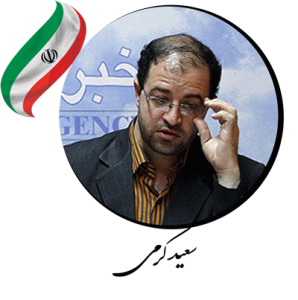
Dr. Saeed Karimi
Head of the Center for Young Intellectual Research
Scientific and administrative records:
- Mayor of Islamshahr
- Legal Director of the Islamshahr Municipality
- Research Director of the research organization of the Ministry of Education
- Legal Advisor of the Cultural and Art Organization of Tehran Municipality
- Deputy of Applied Research of the Institute of Culture and Thought
- Editor of Andesh Gostar Magazine
- Editor-in-chief of English-language magazines Echo, Islam and Al-Wahda
- Assistant Director for Content Production of the Islamic Culture and Communication Organization of the Islamic Association
- The author and translator are about 8 volumes of specialized books
- Research Consultant of Islamic Revolutionary Guard Institute
- Deputy of the Amir Kabir Publishing Organization
- Tutor and Specialist Specialized Courses for International Computational Arbitration
- Specialist in Environmental Law and Environmental Pollution
The main duties of the head of the center are:
- Preparing a program for updating the approaches and strategies governing the activities of the Center and tracking its approval by the Strategic Council.
- Provide annual and annual programs to the Center, and submit to the Strategic Council for approval.
- Strategic and timely efforts to implement approved Approaches, Strategies and Programs.
- Planning and acting to identify and justify, attract and apply the management and scientific authority for the realization of the Center’s programs, and monitoring the good workflow of affairs, as well as systematic and intermittent work of the colleagues, and provide timely reports to the relevant authorities at the Research Center.
- Formation of scientific groups and directing its discussions.
- Continuing action to critique, modify, promote, and develop qualitative and quantitative activities of the Center and track its adoption in the Strategic Youth Council.
- Effective communication with target audiences and effective interaction with matching devices in order to distribute the effects and development of the facilities needed to implement the Center’s programs.
- Follow up of the decisions of the decision-making bodies of the research institute and affairs of the Rajaei from the head of the research institute.
- Setting up and submitting a seasonal and annual report on the progress of program units and groups of the center.
Meet the Young Research Center
Effective research for the younger generation depends on understanding the intellectual, literary and artistic contexts of this class on the one hand and the profound teachings of Islam as the most faithful teachings of the revelation and the most basic component of Iranian culture on the other. Therefore, accurate and deep awareness of Islamic education and production in accordance with the intellectual and cultural needs of young audiences is of particular importance. Considering this strategic truth, the foundation of the formation of a young research center, which began its activities with the goals of deepening and promoting religious knowledge, elitism, the presentation of the intellectual system and the introduction of behavioral patterns for the new generation and by intercepting the principles of the following disciplines:
1 Theoretical and practical commitment to the cultural policies and concerns of the Supreme Leader (Al Madinah) with an emphasis on youth;
2. Stabilize and strengthen the productive center in the discourse of Islamic Revolution;
3. Attention to the Islamic Model of Iran Progress in line with the goals, capacity and capabilities of the Center;
4. According to the requirements and needs of the intellectual and cultural updated younger audience;
5. Young audiences intellectual and cultural needs assessment issues;
6. The core creativity and application of the principle of innovation and initiative in the form and content;
7. Anthropology and critical encounter with thoughts, schools, and currents;
8. Prioritizing the production of intellectual works according to the conditions, crises and cultural, social and political events of the day;
9. Attracting maximum audience while adhering to principles;
10. Avoid addressing sensitive and divisive issues;
11 The tendency towards new, diverse, newly formed text formats;
12. Pay special attention to problems in the production of books written for girls and young women;
13. The emphasis on timely response to the concerns and doubts;
14. The elite and nurturing young writers in the youth field;
